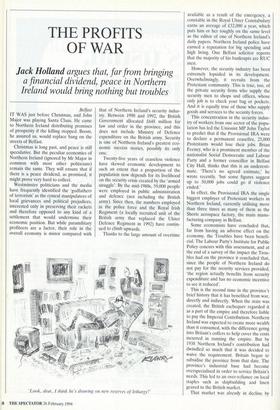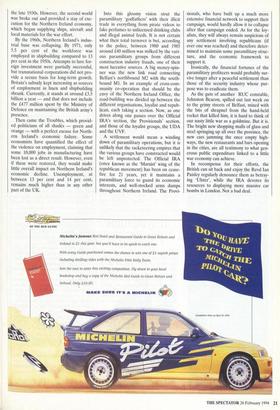THE PROFITS OF WAR
Jack Holland argues that, far from bringing a financial dividend, peace in Northern Ireland would bring nothing but troubles
Belfast IT WAS just before Christmas, and John Major was playing Santa Claus. He came to Northern Ireland distributing promises of prosperity if the killing stopped. Boom, he assured us, would replace bang on the streets of Belfast.
Christmas is long past, and peace is still speculative. But the peculiar economics of Northern Ireland (ignored by Mr Major in common with most other politicians) remain the same. They will ensure that if there is a peace dividend, as promised, it might prove very hard to collect.
Westminster politicians and the media have frequently identified the 'godfathers of terrorism' as the cynical manipulators of local grievances and political prejudices, interested only in preserving their rackets and therefore opposed to any kind of a settlement that would undermine their economic position. But while paramilitary profiteers are a factor, their role in the overall economy is minor compared with that of Northern Ireland's security indus- try. Between 1990 and 1992, the British Government allocated 1648 million for law and order in the province, and this does not include Ministry of Defence expenditure on the British army. Security is one of Northern Ireland's greatest eco- nomic success stories, possibly its only one.
Twenty-five years of ceaseless violence have skewed economic development to such an extent that a proportion of the population now depends for its livelihood on the security crisis created by the 'armed struggle'. By the mid-1980s, 59,000 people were employed in public administration and defence (not including the British army). Since then, the numbers employed in the police force and the Royal Irish Regiment (a locally recruited unit of the British army that replaced the Ulster Defence Regiment in 1992) have contin- ued to climb upwards.
Thanks to the large amount of overtime 'Look, dear, I think he's drawing on new reserves of lethargy!' available as a result of the emergency, a constable in the Royal Ulster Constabulary earns an average of £32,000 a year, which puts him or her roughly on the same level as the editor of one of Northern Ireland's daily papers. Northern Ireland police have earned a reputation for big spending and high living. One Belfast solicitor reports that the majority of his bankrupts are RUC men.
However, the security industry has been extremely lopsided in its development. Overwhelmingly, it recruits from the Protestant community. This is true, too, of the private security firms who supply the security men to shops and offices, whose only job is to check your bag or pockets. And it is equally true of those who supply goods and services to the security forces. This concentration in the security indus- try of workers from one sector of the popu- lation has led the Unionist MP John Taylor to predict that if the Provisional IRA were to declare a permanent ceasefire, 25,000 Protestants would lose their jobs. Brian Feeney, who is a prominent member of the nationalist Social Democratic and Labour Party and a former councillor in Belfast City Hall, thinks that this is an underesti- mate. 'There's no agreed estimate,' he wrote recently, 'but some figures suggest up to 50,000 jobs could go if violence ended.'
In effect, the Provisional IRA the single biggest employer of Protestant workers in Northern Ireland, currently utilising more than three times as many of them as the Shorts aerospace factory, the main manu- facturing company in Belfast.
Some economists have concluded that, far from having an adverse effect on the economy, the Troubles have been benefi- cial. The Labour Party's Institute for Public Policy concurs with this assessment, and at the end of a survey of the impact the Trou- bles had on the province it concluded that, since the people of Northern Ireland do not pay for the security services provided, 'the region actually benefits from security expenditure and has no economic incentive to see it reduced'.
This is the second time in the province's brief history that it has benefited from war, directly and indirectly. When the state was created, the British exchequer regarded it as a part of the empire and therefore liable to pay the Imperial Contribution. Northern Ireland was expected to create more wealth than it consumed, with the difference going into Britain's coffers to help cover the costs incurred in running the empire. But by 1938 Northern Ireland's contribution had dwindled so much that it was decided to waive the requirement. Britain began to subsidise the province from that date. The province's industrial base had become overspecialised in order to service Britain's needs. This led to an over-reliance on local staples such as shipbuilding and linen geared to the British market.
That market was already in decline by the late 1930s. However, the second world war broke out and provided a stay of exe- cution for the Northern Ireland economy, which began supplying ships, aircraft and local materials for the war effort.
By the 1960s, Northern Ireland's indus- trial base was collapsing. By 1971, only 5.5 per cent of the workforce was employed in shipbuilding compared to 13 per cent in the 1950s. Attempts to lure for- eign investment were partially successful, but transnational corporations did not pro- vide a secure basis for long-term growth. Britain's subsidy kept increasing as sources of employment in linen and shipbuilding shrank. Currently, it stands at around £3.5 billion a year — and that does not include the £477 million spent by the Ministry of Defence on maintaining the British army's presence.
Then came the Troubles, which provid- ed politicians of all shades — green and orange — with a perfect excuse for North- ern Ireland's economic failure. Some economists have quantified the effect of the violence on employment, claiming that some 10,000 jobs in manufacturing have been lost as a direct result. However, even if these were restored, they would make little overall impact on Northern Ireland's economic decline. Unemployment, at between 13 per cent and 14 per cent, remains much higher than in any other part of the UK. Into this gloomy vision strut the paramilitary 'godfathers' with their illicit trade in everything from pirate videos to fake perfumes to unlicensed drinking clubs and illegal animal feeds. It is not certain what their total turnover is but, according to the police, between 1980 and 1985 around £40 million was milked by the vari- ous paramilitary groups from different construction industry frauds, one of their most lucrative sources. A big money-spin- ner was the new link road connecting Belfast's northbound M2 with the south- bound Ml. In an example of cross-com- munity co-operation that should be the envy of the Northern Ireland Office, the road-building was divided up between the different organisations, loyalist and repub- lican, each taking a section. Now, as one drives along one passes over the Official IRA's section, the Provisionals' section, and those of the loyalist groups, the UDA and the UVF.
A settlement would mean a winding down of paramilitary operations, but it is unlikely that the racketeering empires that the various groups have constructed would be left unprotected. The Official IRA (once known as the 'Marxist' wing of the republican movement) has been on cease- fire for 21 years, yet it maintains a paramilitary force to guard its economic interests, and well-stocked arms dumps throughout Northern Ireland. The Provi- sionals, who have built up a much more extensive financial network to support their campaign, would hardly allow it to collapse after that campaign ended. As for the loy- alists, they will always remain suspicious of any settlement involving republicans (if ever one was reached) and therefore deter- mined to maintain some paramilitary struc- ture, and the economic framework to support it.
Ironically, the financial fortunes of the paramilitary profiteers would probably sur- vive longer after a peaceful settlement than those of the security industry whose pur- pose was to eradicate them.
As the guts of another RUC constable, Johnston Beacon, spilled out last week on to the grimy streets of Belfast, mixed with the bits of shrapnel from the hand-held rocket that killed him, it is hard to think of our nasty little war as a goldmine. But it is. The bright new shopping malls of glass and steel springing up all over the province, the new cars jamming the once empty high- ways, the new restaurants and bars opening in the cities, are all testimony to what gen- erous public expenditure linked to a little war economy can achieve.
In recompense for their efforts, the British can sit back and enjoy the Revd Ian Paisley regularly denounce them as betray- ing 'Ulster', while the IRA devotes its resources to displaying more massive car bombs in London. Not a bad deal.



























































 Previous page
Previous page